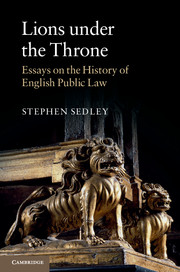Book contents
- Frontmatter
- Epigraph
- Dedication
- Contents
- Preface
- Introduction
- Part I Histories
- 1 Lions in winter: public law in the twentieth century
- 2 The dark satanic mills: the Victorian state
- 3 New corn from old fields: the Hanoverian harvest
- 4 Parchment in the fire: public law in the Interregnum
- 5 The future of public law
- Part II Themes
- Index
1 - Lions in winter: public law in the twentieth century
from Part I - Histories
Published online by Cambridge University Press: 05 November 2015
- Frontmatter
- Epigraph
- Dedication
- Contents
- Preface
- Introduction
- Part I Histories
- 1 Lions in winter: public law in the twentieth century
- 2 The dark satanic mills: the Victorian state
- 3 New corn from old fields: the Hanoverian harvest
- 4 Parchment in the fire: public law in the Interregnum
- 5 The future of public law
- Part II Themes
- Index
Summary
Why did public law, at the height of its powers as it entered the twentieth century, go into prolonged hibernation? What brought it back to life?
The Wednesbury Gaumont
Once upon a time – in 1947 to be exact – in a small town in the west Midlands which has now vanished into the Birmingham conurbation, a sabbatarian group secured a majority of seats on the local council. One of their aims was to halt the growing disregard of Sunday as a day of rest and prayer and the use of the sabbath for secular entertainment. So, when the chain which owned the local Gaumont cinema applied to the council for permission to open on Sundays, the councillors granted the application (probably because they had been advised that they could not adopt a blanket policy of refusal), but made it a condition that the permission was not to include the admission of children under fifteen. For the sabbatarians this was a very satisfactory condition because it meant, in the days before universal television, that parents would not be able to go to the cinema on Sundays either, unless they were prepared to leave their children unsupervised in the house. Effectively the councillors had succeeded in keeping the Gaumont closed on Sundays.
The Sunday observance laws had for centuries forbidden Sunday entertainments. But by the 1930s cinema had become a mass entertainment medium. To enable picture houses to open on a Sunday, the one day when most working people were able to go, Parliament in 1932 passed the Sunday Entertainments Act, allowing local authorities to lift the ban on Sunday entertainments on such conditions as each authority thought fit to impose. This was the power which the Wednesbury councillors were using when they purported to allow the cinema in Walsall Street to open on Sundays provided no children were admitted.
- Type
- Chapter
- Information
- Lions under the ThroneEssays on the History of English Public Law, pp. 23 - 44Publisher: Cambridge University PressPrint publication year: 2015

